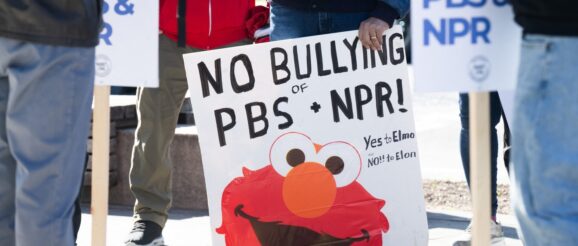kill funding for PBS, and public broadcasters

A simple majority of lawmakers in each chamber must approve what’s technically known as a “rescission request” within 45 days for it to become law. With their slim leads in both the House and Senate, Republicans can afford just a few defections.
PBS President and CEO Paula Kerger testified at that hearing. On Tuesday, she warned that Trump’s proposal would devastate public broadcasting stations, particularly in rural communities.
“Without PBS member stations, Americans will lose unique local programming and emergency services in times of crisis,” she said in a statement. “There’s nothing more American than PBS and we are proud to highlight real issues, individuals, and places that would otherwise be overlooked by commercial media.”
“The proposal, which is explicitly viewpoint-based and aimed at controlling and punishing content, violates the Public Broadcasting Act, the First Amendment, and the Due Process Clause,” Maher said in a statement.
Taking a cue from DOGE on foreign aid
The cuts to public broadcasting are part of a larger package from the White House of $9.4 billion in proposed clawbacks, which include funding for foreign aid. House Speaker Mike Johnson noted that many of the cuts were identified by the task force on government efficiency led by billionaire Elon Musk.
“We thank Elon Musk and his DOGE team for identifying a wide range of wasteful, duplicative, and outdated programs, and House Republicans are eager to eliminate them,” Johnson said in a statement, vowing to act quickly on the request.
Yet that could prove difficult in the Senate. Senate Appropriations Committee Chair Susan Collins, R-Maine, noted the request included a cut to the HIV/AIDS program started by President George W. Bush that is known as PEPFAR. Collins said it was “one of the most successful public health programs in the world without a doubt.”
“I will not support a cut in PEPFAR, which is a program that has saved literally millions of lives and has been extremely effective and well run,” Collins told reporters. She sidestepped a question on cuts to public broadcasting and whether there were enough Senate Republicans to block the bill.
The rescission request follows grousing from conservative Republicans that the budget plan the House recently approved only after Trump visited Capitol Hill would significantly raise the federal debt in coming years.

Yet the $1.1 billion to be rescinded from public broadcasting would make little dent in the $36 trillion national debt, even as it represents the full funding levels for the Corporation for Public Broadcasting through the end of September 2027. Congress approved that funding in March as part of a stopgap spending bill the president signed.
A split largely along partisan lines
While public broadcasting has enjoyed bipartisan support over its decades of existence, many Republicans consider it to have a liberal outlook or bias.
Even so, Alaska Sen. Lisa Murkowski, a Republican, came out last month in favor of retaining federal funding, saying stations in her state provide vital services.
Some leading Democrats also have flagged their enduring support for the networks. Senate Minority Leader Chuck Schumer and Sen. Patty Murray, the leading Democrat on the Senate Appropriations Committee, accused Trump of “misplaced priorities.”
Rep. Dan Goldman of New York, the Democratic co-chair of the House Public Broadcasting Caucus, sent a letter in May signed by 106 lawmakers – all Democrats – to House appropriators in which they advocated for maintaining financial subsidies.
“Without federal support for public broadcasting, many localities would struggle to receive timely, reliable local news and educational content, especially remote and rural communities that commercial newsrooms are increasingly less likely to invest in,” stated the letter. “In states such as Alaska, Minnesota, North Dakota, and Texas, rural public radio stations are often the only weekly or daily news source in their communities. Even in places with other daily or weekly news sources, those outlets may not be directing resources toward original or locally based stories, leaving it to public stations to fill the gap.”
A broader attack on public media
Asking Congress to claw back funds, however, is unquestionably legal. And it has prompted a flurry of lobbying. Officials from nearly 200 public radio stations flooded Capitol Hill in May to tell lawmakers about the value they say they bring to their communities and regions.
By law, Trump’s request kicks off the 45-day period for Congress to consider his request. The last time a president successfully made a rescission request was a generation ago.
